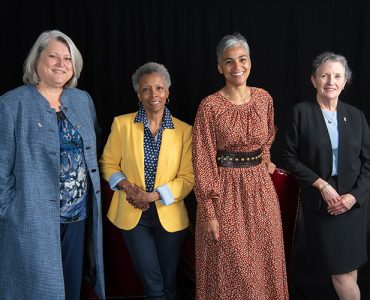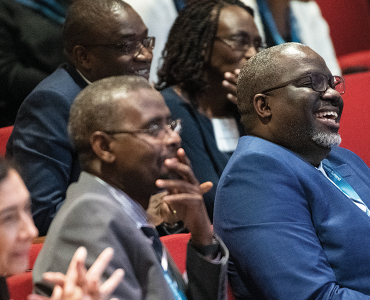Equity, diversity, and inclusion. Or EDI. That order matters to Diane Forbes Berthoud, PhD, MA, who is the University of Maryland, Baltimore’s (UMB) first chief equity, diversity, and inclusion officer and vice president.
“I have outlined that part of my agenda will be around focusing on equity, which is understanding the barriers and disparities that exist in whatever social or organizational system, and not just understanding them — assessing them so that we are literally measuring numbers and the persons who are represented,” she said during an interview on “The UMB Pulse” podcast.
As Forbes Berthoud hinted, to lead with equity, she has to lead with another “D” word: data.
Gathering and synthesizing that data will take a team — she will hire a director and an assistant in her office who are expected to be on board for the spring 2022 semester. And it will take time, coupled with a strategic plan for what and how UMB with pave a path for its EDI priorities.
Forbes Berthoud provided a preview of what’s to come along with discussing her journey to UMB on “Virtual Face to Face with President Bruce Jarrell” and a two-part interview on “The UMB Pulse” podcast.
Her journey to UMB began as a young girl in Jamaica with big dreams, moving to Miami to graduate from Barry University with a bachelor’s degree in communication and a certificate in Spanish translation, and she never looked back. After earning her doctorate and master’s degrees in organizational communication and social psychology, her career has largely been as a researcher, faculty member, and administrator with lengthy time spent at Trinity Washington College and the University of California, San Diego, where she was most recently associate vice chancellor for equity, diversity, and inclusion before coming to UMB in July.
Here are excerpts from her interviews edited for clarity to give insight into Forbes Berthoud.
Who inspired you growing up?
My father was an entrepreneur who, from 1972 to the time of the 2008-09 recession, had a business in Jamaica, and he chose to run his shipping business in an urban part of the city and one of the poorest areas and never moved from that area. He employed people from the community and built his business with those persons from the community until he retired. He never lectured us on what it meant to be kind and thoughtful and to build up the community. It was just his way of living.
And my mother, of course, as a woman, as a teacher and educator, she was a great influence as well — kind, hospitable, wise, smart, very driven. She went to get her master’s degree before I went off to college and ended up being a teacher. She was a third-grade teacher and then moved up through administration.
When I was younger, she asked, “What do you want to be?”
I said to her, “I want to be a teacher, like you.” And she said, “No.”
She said to me, “It’s OK. Teaching is great. If you want to teach, teach at the university. You should work in administration or seek to run things.”
She was thinking way before her time of women’s leadership, advancement, promotion, being in those roles when 30 to 40 years ago there were very few women in a leadership role.
What are your goals for the fall semester?
First off, get a staff.
I’ll have a director of equity, diversity, and inclusion, and that person will help me beyond scheduling, which my assistant will help me to do, to coordinate everything else with strategic planning, implementation reports, writing research, collaboration with campus event planning, and project management.
I’m hoping a director will help me craft those programs, launch them, communicate a communication strategy, and help me in some areas where I’m unable to be and help me produce things that I need to produce.
How should UMB evaluate how to advance equity, diversity, and inclusion initiatives?
First, we start with the data. And we have some sources of data to which we can point to at the moment that tell us about representation, who’s where and when, and who populates what particular ranks or what particular levels.
We can measure not only who is where, which is measuring presence, but we can then look at progress over time: time to degree, time to tenure, time in rank or time in title or position, and assess then, is this equitable? Are there some difficulties here?
After staff and data, then it’s thinking about what’s next. Synthesizing what we know and hoping that once a strategic plan for the campus is finalized, we’ll have a framework for equity, diversity, and inclusion that we can build together. And then from there, we begin to execute some things in terms of events and programs.
What’s your preliminary report card on where UMB is with equity, diversity, and inclusion?
My own research and findings and my conversations with everyone reveal that our campus is very engaged and very committed, and I’ve been really impressed with expertise on campus when it comes to equity, diversity, and inclusion.
There are lots of programs, speaker series, trainings, diversity committees. I’m very encouraged by that because most campuses don’t have that type of activity.
What I certainly think is an opportunity, which is why I know my position in this office has been created, is in and around cohesion — building cohesion and a comprehensive picture.
What does this all mean? I heard repeatedly, including in a meeting I was in recently, “What you need to understand, Dr. Forbes Berthoud, is there are a lot of silos here” or “We’re very siloed.” That’s a word I’ve heard quite a bit from very early on in the year before my hiring, even until after starting.
There’s an opportunity here to think about collective effort and how we can act more collaboratively in what we do related to equity, diversity, and inclusion.
Finally, for all of the programs and activities that there are, as a strategist and an analyst myself, I would invite us to ask: To what end? What do these programs and activities produce? What are those goals? Have we assessed? Have we met those goals as it relates to our institution?
To hear more from Diane Forbes Berthoud, watch her on “Virtual Face to Face with President Bruce Jarrell” or listen to her on “The UMB Pulse” podcast.




